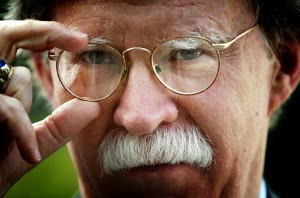Some causes for concern following John Bolton appointment
هآرتس: بعض الأسباب التي تستدعي القلق بعد تعيين جون بولتون
Ron Ben-Yishai/Ynetnews/March 25/18
Analysis: The current makeup of the Trump administration doesn’t bode well, not only for Iran but also for North Korea and China, Putin, Assad and EU leaders. Netanyahu should be satisfied on the surface with the appointment of a clear friend of Israel as the new national security adviser, but the IDF might want to check its war reserve stores just in case.
Tehran woke up Friday morning to an unfavorable situation for the Iranians. The dismissal or resignation—it’s not entirely clear yet—of General H.R. McMaster from the position of US President Donald Trump’s national security adviser, and his replacement with former US Ambassador to the United Nations John Bolton, points not only to the disorder in the top echelon of the American administration and in the White House, but mainly to a foreign and security policy that favors conflicts over settling disputes through diplomacy.
The national security adviser who was dismissed or stepped down on Thursday evening, a decorated general with extensive experience in the battlefields of Iraq and Afghanistan, was against a US withdrawal from the nuclear agreement with Iran. Bolton, on the other hand, has publicly called on the administration several times to abandon what he defines as a bad agreement.
He isn’t the only one. The new secretary of state, Mike Pompeo, who replaced Rex Tillerson several weeks ago, is a diplomatic and security hawk who has also called for a cancellation of the nuclear agreement with Iran and for a conflict with North Korea. Pompeo, who came to the State Department from the leadership of the Central Intelligence Agency (CIA) of the United States, was replaced by Gina Haspel, who shares his thoughts and is possibly even more radical than he is.
The current makeup of the Trump administration doesn’t bode well not only for Iran but also for North Korea and China, and likely for Russian President Vladimir Putin, Syrian President Bashar Assad and leaders of the European Union countries as well.
The Iranians are facing a clear dilemma now. They will have to agree to restrain their ballistic missile program and make amendments to their nuclear agreement with the world powers—or suffer harsh economic sanctions, which will badly affect the Iranian economy. On the other hand, they may decide to stop playing by the rules and move forward towards a nuclear bomb, risking an American airstrike on their nuclear facilities and missile.
These are basically the two strategic alternatives that will be have to be considered now by Iranian supreme leader Ali Khamenei and the ayatollahs. The Europeans will also have to double their efforts from now on and convince Iran to accept the compromise they are working on with the US, in a bid to prevent Trump from walking away from the nuclear agreement. The Iranians will likely become more attentive to Europe’s leaders, after they realize that the alternative could be a military conflict with the US.
Assad should prepare himself
Another equally important strategic issue which will likely be reexamined in light of the changes in the US administration’s foreign and security policy is the planned meeting between Trump and North Korean leader Kim Jong Un.
The new national security adviser, who served as ambassador to the UN under President George W. Bush, argued recently that the meeting with the North Korean leader was a “waste of time,” based on the experience of previous US administration that had reached agreements with Pyongyang and then saw them violated.
A cancellation of the meeting, which is scheduled to take place in late May, could create a new explosive situation in East Asia, in the Korean Peninsula and in Japan. But that’s not all. The Trump administration recently announced new sanctions on Russia. Bolton and Pompeo will likely demand an even more hawkish policy.
The Chinese president should be as concerned as Putin. The recent US announcement on tariffs on steel and other products imported from China is essentially a first step towards a trade war with China under the “America First” slogan.
Assad, who is using chemical weapons against his own citizens, has a real cause for concern too. Rex Tillerson was a moderating factor in the American administration. Secretary of Defense James Mattis represents a level-headed approach too, not now he is a minority in the administration, and if Assad uses chemical weapons once again, he should take a harsh American response into account. In fact, Assad has already started preparing for such an option in after being told by the Russians that the Americans could attack him at any given moment.
If US is perceived as unreliable, Israel suffers too
Jerusalem allegedly has a cause for celebration. Bolton, the new national security adviser, is a clear friend of Israel. So is US Ambassador to the UN Nikki Haley and new Secretary of State Pompeo. They are all in favor of moving the embassy to Jerusalem and they all support Trump’s oppositional approach towards America’s enemies in the international arena and towards its economic competitors.
Prime Minister Benjamin Netanyahu can be satisfied, therefore, as his approach towards the nuclear agreement with Iran seems to be supported now not only by the president but by the entire American security-diplomatic echelon, perhaps excluding Secretary of Defense Mattis, who listens to the what the Pentagon generals tell him.
My advice to IDF Chief of Staff Gadi Eisenkot, however, is to check the war reserve stores, so we don’t accidentally find ourselves involved in a war we didn’t initiate as a result of the unpredictable, zigzagging conduct of the US president and his senior administration officials.
Netanyahu can be satisfied with other issues as well, like the approach towards the Israeli-Palestinian conflict. In the current state of affairs, Trump likely won’t rush to present his plan for peace in the Middle East. There is a good chance that he will shelve it for a long time, perhaps even a year.
But the current Israeli government and Israel’s citizens should have a cause for concern, not so much because of President’s Trump conflict-seeking policy and his walk on the edge when it comes to international and strategic issues, but because of the disorder in the White House. In his 14 months in office, Trump has replaced three national security advisers. This is something that has never happened in US history. The national security adviser in the American administration is as important and sometimes even more important than the secretary of state, and is almost equal in status to the secretary of defense. He is the man who whispers in the president’s ear and briefs him every morning. He is the man the president trusts.
The replacement of three national security advisers indicates, therefore, that Trump is incapable of taking advise and, most importantly, that he has no self-discipline and no willingness to accept organized strategic planning that presents him with all the options from which he must pick out one. He has zero attention span and works according to intuition rather than according to strategic planning and discretion. Another problem is that there is no one in the administration now to present an opinion that contradicts the president’s opinion. Contradicting opinions are important, as they force all sides to reconsider and reach optimal decisions.
In Israel, we experienced a similar situation in the Second Lebanon War, when a prime minister who had just taken office, and had appointed a defense minister and chief of staff with little experience, entered a war without realizing he was entering a war. He and his cabinet were convinced that they were initiating a limited battle, and we all know what happened next. The same thing could happen with Trump, but at a much larger scale and with major ramifications.
If we’re already making comparisons, I should say that while the Second Lebanon War was managed terribly, we have been enjoying a relative calm in the north for the past 11 years thanks to the Israel Air Force. President Trump’s unreasonable conduct and the chaos in his administration could have positive results too. The Iranians may, for example, reach the conclusion that they shouldn’t get involved in a conflict with an unpredictable American president at this time. But that’s a gamble, and no one wants matters of war and peace, of life and death, to be in the hands of a man who is an obsessive tweeter and who declares war and then changes his mind, and so on and so forth.
We must remember that America’s international standing has a direct effect on the State of Israel’s security. The US is our patron. That doesn’t mean we’re incapable of defending ourselves, but America’s strength is an important component in Israel’s deterrence against its enemies, primarily Iran. If the US is perceived in the world as an unreliable country that can’t be trusted, Israel suffers too.
https://www.ynetnews.com/articles/0,7340,L-5194967,00.html






















